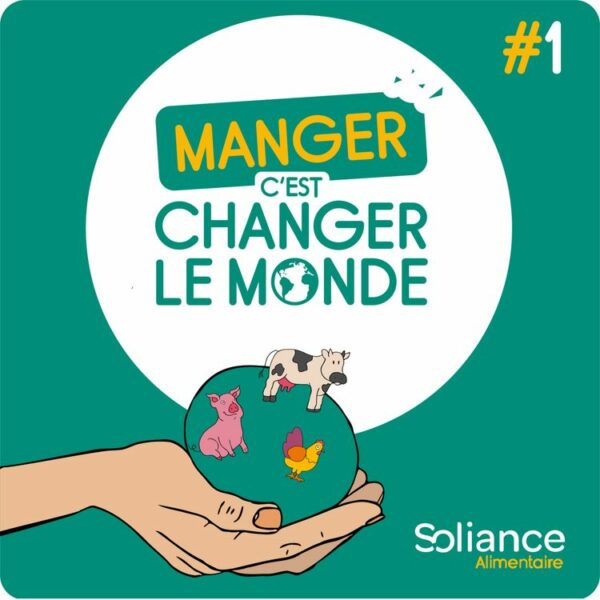Manger, c’est changer le monde, la série de podcasts qui décode les systèmes alimentaires – Épisode 1
Pour ce deuxième épisode de Manger c’est changer le monde, nous retrouvons Eloi Lebert, spécialiste de la filière élevage et consultant chez Soliance Alimentaire. C’est à travers de 5 minutes de partage qu’il nous fait part de ses éclairages au sujet de la transformation nécessaire de la filière élevage. Il nous révèle la nature paradoxale des problématiques en jeu. Reconnaissant de ce que l’élevage nous apporte depuis les débuts de l’histoire de l’humanité, il est engagé pour la transition vers un modèle d’élevage plus durable.
Filière élevage : une activité humaine indispensable pour la planète ?
Une filière née 20 000 ans avant J.C.
L’élevage a été adopté par l’Homme il y a plusieurs millénaires. Depuis des siècles, cette activité humaine répond à nos besoins dans différents domaines : l’alimentation, le transport, le travail, les loisirs, l’habillement, le chauffage, la production d’énergie, ou encore la fabrication d’engrais. Malgré ces externalités positives, la filière élevage fait aujourd’hui face à de nouveaux défis liés à l’impact qu’elle a sur l’environnement et les ressources planétaires.
Eradiquer l’élevage nous priverait de nombreux externalités positives
Au-delà de son apport nutritionnel, l’élevage est à l’origine d’externalités positives :
- la conservation des écosystèmes et de la biodiversité associé,
- le stockage du carbone dans les sols,
- l’entretien des paysages, ainsi moins vulnérables aux aléas climatiques.
L’éradication de l’élevage créerait un immense déséquilibre et des désastres de tous ordres. Une décision si radicale n’est donc pas celle que nous prévoyons chez Soliance Alimentaire. En revanche, nous sommes convaincus que les filières d’élevage doivent profondément se transformer. Pour y arriver, la filière a de nombreux défis à relever :
- combiner systèmes d’élevage et filières durables
- rendre la viabilité économique de la filière plus robuste
- assurer l’acceptabilité sociale de l’élevage
L’élevage sous pression : surconsommation de ressources et impact environnemental
Au cours de ces 5 minutes d’échange, Eloi Lebert, consultant Soliance Alimentaire, appelle à regarder en face les rapports du GIEC au sujet de l’élevage. Ceux-ci soulignent que la filière participe aux changements climatiques :
- Directement, si on se concentre sur les émissions de gaz à effet de serre
- Indirectement, si nous prenons en considération les dommages créés par la déforestation
Il nous rappelle également que 75% des terres cultivées dans le monde servent à produire :
- L’alimentation des animaux d’élevage
- Du lait
- De la viande
Selon ses modalités de production, l’élevage peut donc entraîner une pollution directe sur l’environnement, altérer la qualité de l’air, de l’eau et menacer la biodiversité.
Nouveaux modes d’élevage durable
Quid de l’élevage extensif ?
Eloi Lebert nous apporte également des précisions au sujet de l’élevage extensif, un modèle économe en intrants (énergie, engrais, matériel). Cette approche ne recherche pas une forte productivité individuelle par animal, ni une forte productivité par unité de surface. Ces deux points la différencie du mode d’élevage intensif. Il distingue également les ruminants – qui valorisent les matières riches en cellulose ; des monogastriques, qui valorisent les grains ou déchets alimentaires.
Le pâturage, un mode d’élevage durable pour un certain nombre de territoires
Sous l’effet de l’augmentation de la demande en viande (volume/fréquence), le développement et l’intensification de l’élevage a conduit à une accélération des pollutions. Cet constat remet en cause certains modes d’élevage dans de nombreux territoires. Pour Eloi Lebert, l’élevage y est pourtant parfois la seule manière viable de produire, notamment s’il est conduit en pâturage.
L’action de Soliance Alimentaire pour le développement de filières d’élevage durable
Soliance Alimentaire accompagne la prise de conscience et la soif de transformation des acteurs de la filière élevage
Pour Eloi Lebert, réussir ces transformations dépend de tous les acteurs des filières et des territoires auxquels elles sont liées. Leurs prises de conscience et l’envie de réussir ces transformations doit guider l’action des acteurs des territoires.
Chez Soliance Alimentaire, notre mission est d’accompagner ces acteurs et leurs démarches. Ce travail commence par un diagnostic partagé renforcé par l’engagement des acteurs. Pour réussir ces transformations, la mobilisation du plus grand nombre est dès lors nécessaire.
Une démarche appliquée sur le terrain dans le Sud de la France
Eloi Lebert illustre le travail de Soliance Alimentaire dans ce domaine :
« Nous l’avons fait avec la filière des Alpes du Sud, où la culture laitière et fromagère perdure malgré les contraintes de l’agriculture de montagne. L’élevage dans cet espace joue un rôle légitime en entretenant et en exploitant des espaces ruraux et pastoraux ».
A l’issue d’un diagnostic établi avec les partenaires de la filière et les partenaires institutionnels, Soliance Alimentaire a co-construit un ensemble d’actions visant à dynamiser la filière. Ce type d’accompagnement permet de répondre à plusieurs enjeux de valeur et de durabilité. Un ensemble d’actions qui permet de pérenniser les filières d’élevage et d’y intégrer les grands principes du développement durable.
Vous avez aimé ce contenu ? Rendez-vous le mois prochain pour un nouvel épisode de Manger, c’est changer le monde.
En attendant, n’hésitez pas à partager cet épisode autour de vous, mais également à donner vos avis sur notre série de podcasts.
Pour patienter, écoutez un autre épisode de Manger c’est changer le monde :




